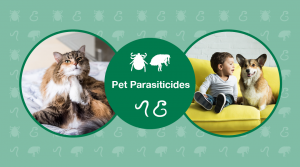Back to Topics
Companion Animal Parasiticides
Protect your pet from fleas, ticks, and worms.

Fleas, ticks, and worms pose a year-round risk to our pets. For instance, it has been estimated that 1 in 4 cats and 1 in 7 dogs in the UK have fleas 1 and 86.6% of soil samples taken from UK & Ireland parks contained roundworm (Toxocara) eggs 2. Today, the risk of parasites to the UK pet population is growing. Increased travel and movement of cats and dogs combined with climate change are enabling parasites to thrive and spread into new areas.
What does this mean for pets and people?
Parasites risk the health and wellbeing of our pets, for example:
- Fleas cause persistent itching, scratching, and chewing. This can lead to open sores and wounds on the pet’s skin which can leave them vulnerable to infection. Some cats and dogs can also be allergic to flea bites.
- Ticks can carry diseases which can be passed on to our pets when a tick feeds, causing disease in our pets, which can severely impact our pet’s health and welfare.
- Worms can cause suffering, illness and sometimes even death if infestations are severe.
The health and welfare implications of parasites can be a shared experience, as they also risk human health and wellbeing, as some diseases that fleas, ticks, and worms carry can also infect people (Zoonotic diseases). Additionally, infestations in our pets can result in the household becoming infested. For instance, adult fleas and eggs can survive in clothing, bedding, and carpets. It can be difficult to get rid of them when they infest the home environment, and they may require professional extermination.
Parasiticide treatments
Fleas, ticks, and worms in our pets can be prevented and controlled through the use of parasiticide treatments. As parasites can be a shared experience, preventing them helps protect the health and wellbeing of both animals and people. Many of these treatments are available on prescription from veterinary practices, with other treatment options also available at pharmacies, pet stores and supermarkets, and in some instances online. Your vet or a suitably qualified person (SQP) will advise on treatment options and frequency, as they can consider the individual needs and risk of parasites to your pet.
As with all veterinary medicines, it is important to use parasiticide treatments correctly, safely, and responsibly, in the way they are intended to be used. Always read and follow the information provided with your pet’s medicine to ensure the product is used correctly. For more information on how and why to read the information provided with pet medicines see NOAH’s Paws to Protect campaign.
Can pet owners have confidence in veterinary medicines?
All veterinary medicines marketed in the UK are subject to strict regulation. They have undergone an independent scientific assessment with the Veterinary Medicines Directorate (VMD), a Government Agency, before they are allowed to be placed on the market and used. This independent assessment considers the product’s quality, efficacy, and safety, including safety for pets, people, and the environment. Once they are on the market, their use and safety is kept under review by the VMD.
Part of the regulatory process includes approval of the information provided with your pet’s medicine (the leaflet and all packaging). This helps ensure you can use the product correctly and safely, whilst maximising its therapeutic benefit.
For further information please visit Companion Animal Parasite Control on the NOAH website.
References
- Abdullah S, Helps C, Tasker S, Newbury H, Wall R. Pathogens in fleas collected from cats and dogs: Distribution and prevalence in the UK – parasites & vectors. BioMed Central; 2019. Available from: https://parasitesandvectors.biomedcentral.com/articles/10.1186/s13071-019-3326-x
- Airs PM, Brown C, Gardiner E, Maciag L, Adams JP, Morgan ER. Wormwatch: Park soil surveillance reveals extensive toxocara contamination across the UK and Ireland. Veterinary Record. 2022;192(1). doi:10.1002/vetr.2341
6 November 2023